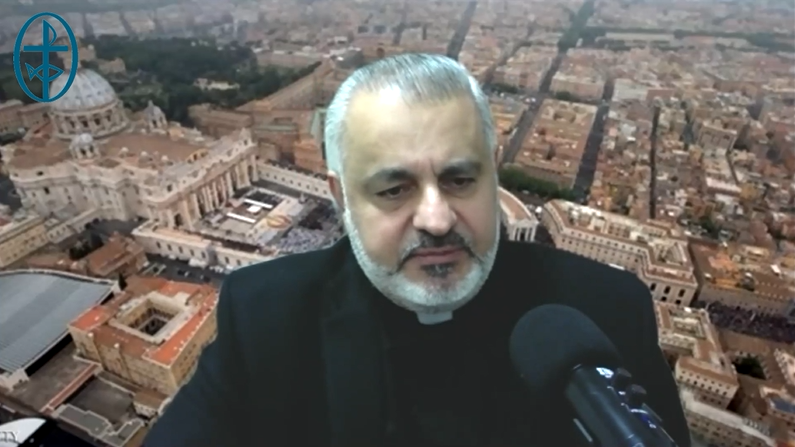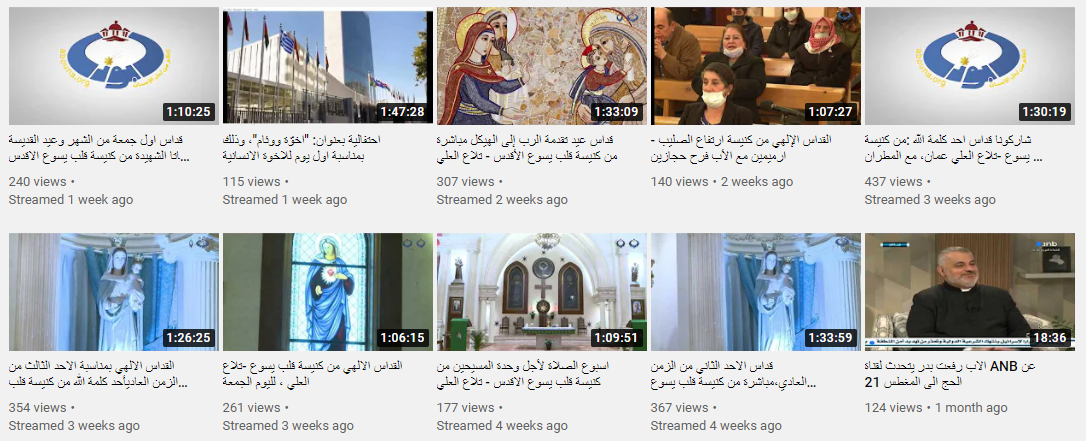Video - In Times of Corona, Fr. Rifaat Bader: Christian Media Spreads Heavenly Comfort to Houses Paying Their Dues in Silence
Report and interview: Elia Nasrallah
When churches closed their doors to the believers while they were in dire need of assuaging their spiritual thirst facing the threat of the Coronavirus and the imposed quarantine, a religious issue was brought up: Is our relationship with God threated?
While the world experiences emergency measures for more than a year, trying to curb the deadly virus, the answer came through modern media, which sought to present the essence of Christian beliefs, especially during holidays and their rituals, accompanying believers during these difficult times.
How did media close the distance between earth and heaven? How did it open the virtual doors of churches to protect believers from the Corona outbreak? Head of the Catholic Center for Studies and Media Fr. Rifaat Bader, answers these questions in a virtual meeting. He also presents the results of studies carried out by the Catholic Center for Studies and Media and "Abouna website" on the subject.
What is the role of Media, especially religious Media, during these trying times? And how did it help believers maintain their relation with God?
Head of the Catholic Center for Studies and Media Fr. Rifaat Bader
Media helped the church stay in contact with its believers, it didn’t replace the church. Churches did close their doors, but prayers didn’t stop. In Jordan, for instance, the Catholic Center for Studies and Media and "Abouna website" launched "My Home My Church" campaign on its main website and its social media platforms. Since then, this concept has become entrenched in believers. Closing churches does not mean preventing prayers, but rather preventing access to churches as a geographical location. Therefore, prayer was not forbidden, we can still pray at home through the available media, especially social media platforms, which broadcast all liturgical celebrations live.
The challenge was great, especially with the beginning of the Coronavirus outbreak in the midst of the forty-day fasting and Easter preparations. These are liturgical times rich in wonderful celebrations that believers yearn and wait for annually. This is why we had to double our efforts and provide high-quality live streams via electronic devices, so that quarantined believers can feel close to Church.
Media played a fundamental role in keeping believers in contact with the church allowing them to participate in religious celebrations, especially the ones related to this liturgical period people long awaited. We didn’t let frustration get to believers, we continued to work on maintaining this communication. Believers began asking about the broadcasting dates of masses, prayers, the path of the Cross and the daily Rosary, to prepare themselves at home.
During the religious ceremonies, we asked families to send us their pictures with their home preparations. The interaction was positive and pictures matched the liturgical celebrations. For example, some families put during this week an embodiment of the Christ and a picture of him on the cross, as for Palm Sunday, they prepared branches to be blessed when the bishop or the priest blesses them over the Internet. We also received pictures of families who had set up chairs in their houses in a church-like manner. They would wear their clothes, have their hair styled and would participate in the mass as if they were at church. On Saturday, they would turn off the lights in their homes and light candles. This is how interaction and participation developed. "My Home, my Church" became reality as homes turned into churches. We always stressed that one should attend the Mass not as a witness, but as a participant.
What kind of content did “Abouna Website” work on and deliver to believers and participants during the lockdown?
At first, "Abouna Website" started broadcasting the main religious celebrations, such as daily masses, Sunday masses, and the prayers of the Path of the Cross of the forty-day period, in addition to the Holy Week celebrations, starting from Palm Sunday until Easter Sunday. We also cooperated and organized with the Latin Archdiocese, where Patriarchal Vicar for Latins in Jordan Archbishop William Shomali was in charge of the celebrations with the help of other priests.
Abouna.org’s logo
Due to strict preventive measures, we were not able to move around to broadcast these celebrations if not for specific permits. Permits were difficult to obtain due to the complete lockdown imposed on the country. However, we were able to obtain many permits, such as those granted for media issued by the Crisis Management Department in Jordan.
We witnessed cooperation between the Church and state authorities in order to ensure a unified mass broadcasted for all. On Palm Sunday, we asked our fellow priests from different parishes to unify the Mass from Palm Sunday until Easter. There was a remarkable commitment from priests, as they were satisfied with what "Abouna Website" was broadcasting and shared this broadcast on the websites of their parishes. Here lies the cooperation between "Abouna Website", the Catholic Center and the websites of the parishes to unify masses.
On the other hand, we provided additional material: the daily broadcast of the Rosary, in addition to the broadcasting of the sermons of patriarchs, pastors and priests ... In times of pandemic, we not only need to partake in religious celebrations, but also to hear spiritual speeches. Here, the role of the media is to prepare believers to accept God’s will, whether it was illness or the loss of a loved one, God forbid. This is how the Christian spirit enters homes to live in faith in times of pandemic, and thus the role of the media in helping believers strengthen their faith.
How do you describe the experience of the Media in the midst of the Corona outbreak? Do you think the Media would acquire a consistent role in the religious and spiritual mission in the upcoming stages this year?
From “Abouna.org” YouTube channel
The media today is going through an important and one-of-a-kind stage due to its development and progress. This is the first time in history that the media plays such a role, and it didn’t disappoint us. Official institutions provided the latest news of the pandemic and spread awareness campaigns while religious and Christian media took the responsibility to prepare believers to accept God’s will and live in faith in the midst of difficulties and tribulations.
We don’t always live in peaceful and reassuring times but what’s important is that the heart remains at ease despite everything happening outside. The audience included a large number of infected people and the people living with them. The media sent them, and all those living this tragedy since the beginning of the pandemic until today, a comforting message, especially since our fate remains unknown due to the aggravation of Corona repercussions. For example, in the first months of the outbreak, I received a letter from a journalist in which she explained how she wanted to visit her son in London and got infected with the virus, and how the live broadcasts and the materials that we were presenting helped her feel better. This is comforting for me too, especially since our mission is to spread hope and healing. One father also informed me that his 18-year-old son suffers from cancer, and they are watching together from the hospital everything we broadcast.
Here, the mission of the media became clear as it was a call for all media institutions to be more humane. In Lebanon, for example, political statements, dialogues, and quarrels are ravaging media outlets. The mission of media is not only to publish political leaders news but also to fulfill its humane role and spread heavenly consolation in suffering homes and carry their crosses, often in silence. By spreading hope and healing among the infected and those treating them, we spread a new image of the media in our contemporary society, away from political controversial useless debates. Media must use this humane vision to serve people.
Tell us about this experience in Jordan and the Holy land.
There is no doubt that relying on media was important, especially since the beginning of the Corona outbreak came during the two holy weeks. In Jerusalem we used to celebrate according to the Western Time and in Jordan according to the Eastern Time. Our mission was to broadcast prayers and religious celebrations in the Holy Land, specifically in Jerusalem, in cooperation with the Franciscan Christian Media Center in Jerusalem where this service was provided to believers. As for us, “Abouna Website” and the Catholic Center, we broadcasted with them as well.
This is a new vision reflecting the cooperation of media with each other, provided that their relation is not solely based on competition. It is important that our channels and websites cooperate because the goal is one. We often witness a steamy competition between Christian TV stations. For me, competition should not exist because the goal is to provide services to people in their home and workplace. These dire circumstances taught us to cooperate as media institutions to serve suffering people.
Numbers and facts – Media and the Church during the Coronavirus outbreak
Fr. Rifaat Bader shared with us a study conducted by the Catholic Center for Studies and Media and “Abouna Website” during the months of May and June, 2020 entitled “Christian Media at the Service of Faith During Corona”. The study was done through a questionnaire directed to their social media audience. Around 5,000 people participated, of whom 65% were women and 35% were men of all age groups. According to study results, there’s a significant number of young people who follow religious subjects. According to Fr. Bader, this is a positive sign that the message is reaching young people who are often never satisfied.
According to Studies Results:
According to the study, social media was the most used method for following religious celebrations (67%). According to Fr. Rifaat Bader, there are no religious television channels in Jordan, which caused a large number of believers to resort to social media platforms.
Because of the lockdown, people were unable to see relatives and follow religious programs with them. Therefore, family members (68%) would all assist, especially since the YouTube service through which prayers were broadcast was available, according to Fr. Bader, on television screens in many homes. The Coronavirus crisis and the broadcast of prayers through Media have united the families. Bader referred to a saying: "A family that prays together stays together," adding, "during these times, collective prayers are reflected in people's lives with more love and affinity inside homes."
According to Fr. Rifaat Bader, it is very important to consolidate one’s faith. Participating in prayers and celebrations through the Media is not like watching a movie. He also explained that the texts of these celebrations were published allowing believers to have access to them during celebrations.
We can’t help but notice that Media was and and still is offering new content to help believers maintain a relationship with God through the transmission of prayers, masses, documentaries, hymns…
The Catholic Center for Studies and Media offered alongside “Abouna website” many educational programs, especially before the beginning of the Holy week, helping believers prepare for this important time of year and live its spiritual depth.
Communication and Public Relations Department








